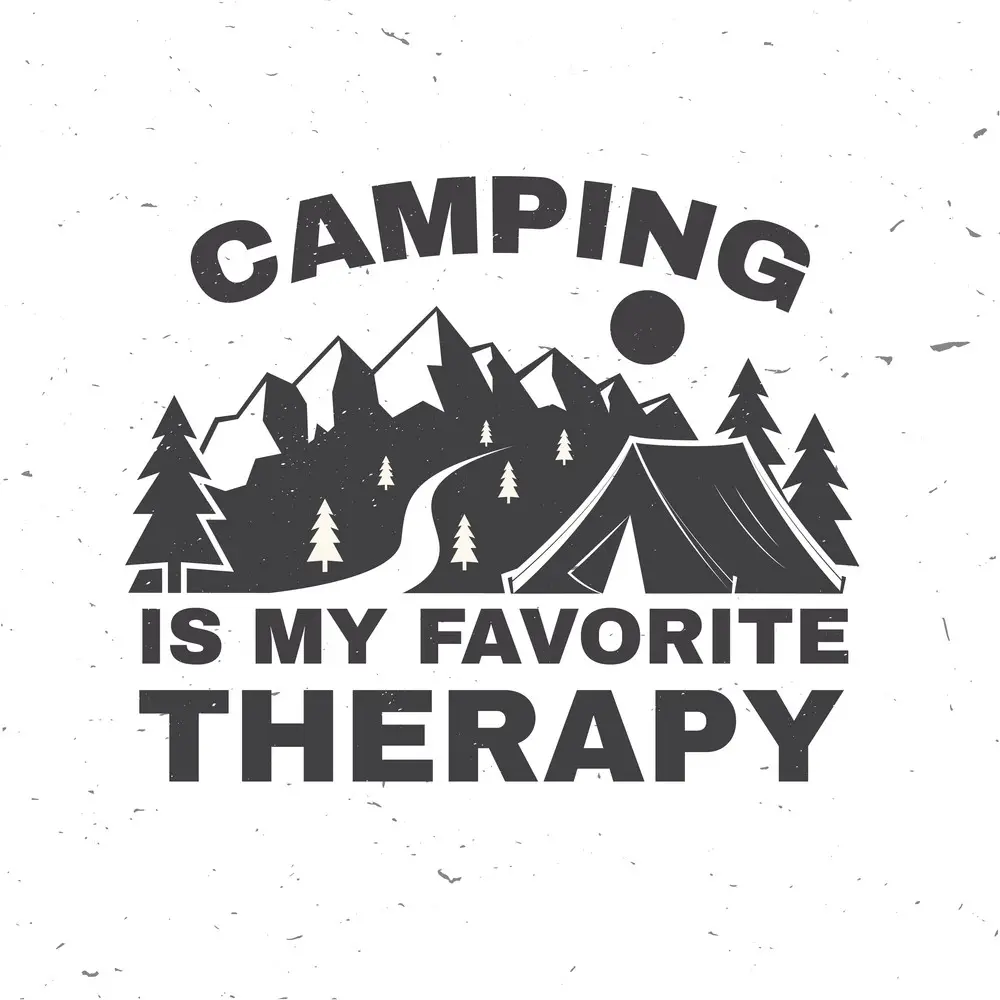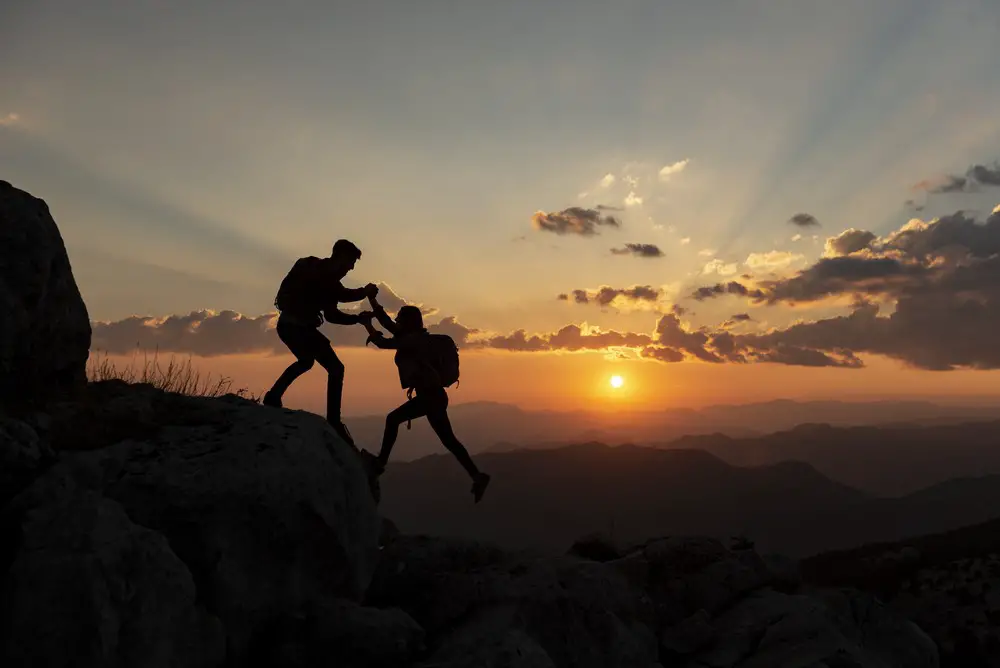As a BetterHelp affiliate, we receive compensation from BetterHelp if you purchase products or services through the links provided
Many people find that traditional face-to-face therapy isn’t easily accessible or doesn’t provide them with the results they want. It can be expensive and time-consuming, and some people feel uncomfortable discussing their issues in an office setting.
If this is the case for you, you shouldn’t assume that you’ll find no benefit from therapy. Many alternatives to conventional treatments can be just as effective and much more enjoyable. For example, online therapy is becoming more popular as it offers privacy and convenience.
But there’s another option that may be even more useful for some: adventure therapy. From wilderness therapy to ropes courses, adventure therapy offers a unique approach to mental health and can effectively treat many mental issues.
What is Adventure Therapy?
Adventure therapy is an alternative approach to treatment that involves challenging physical activities and outdoor exploration.
This type of therapy is based on the idea that people can learn more about themselves and their environment by participating in rock climbing, hiking, white-water rafting, or kayaking.
It also helps them build confidence, develop self-esteem, and take control of their lives by facing physical challenges in a safe environment.
Adventure therapy falls into experiential therapy, based on the idea that people can overcome their issues by trying out different activities and having new experiences. It is believed to be particularly helpful in treating anxiety and depression, substance abuse, behavioral problems, and trauma.
Being outdoors has proven to boost mental well-being and can provide an escape from everyday pressures and distractions. Therefore, adventure therapy seems like a perfect solution for people who want to tackle their issues in a fun and active way.
Many groups and providers specialize in adventure therapy and can provide the necessary guidance, support, and equipment to participate in activities.
Usually, people of any age and ability level can participate in adventure therapy programs, so it’s essential to research the available options and find a provider that will suit your needs.

Types of Adventure Therapy
Adventure therapy activities are often divided into two categories: low-impact and high-impact. Low-impact activities include nature walks, team sports, or canoeing. High-impact activities are more strenuous and involve rappelling, mountain climbing, or white-water rafting.
There are many different types of adventure therapy available. There’s sure to be something that fits your needs, whether you’re looking for an intense physical challenge or a more relaxed outdoor activity.
Wilderness Therapy
This adventure therapy typically involves spending several days or more in remote, natural environments. Activities involve challenging physical and mental tasks, such as hiking long distances and problem-solving activities.
This can be great for people facing physical challenges in an isolated setting. It can also help individuals develop resilience and confidence.
Water-Based Therapy
This type of adventure therapy involves activities such as kayaking, rafting, and sailing. It can be a great way to connect with nature and practice physical skills while learning about the environment.
The main benefit of this type of therapy is that it offers a chance to challenge yourself in an exciting and adventurous way.
Adventure-Based Counseling
This adventure therapy involves shorter, guided outdoor activities focusing on team building, problem-solving, and communication skills.
This therapy is excellent for individuals or groups who want to understand their interpersonal relationships better and learn to work together as a team.
Equine Adventure Therapy
In this therapy, people work with horses to learn about themselves and gain a sense of accomplishment.
Exercises help people build communication and trust and develop life skills such as problem-solving and decision-making.
What Mental Health Issues Can Adventure Therapy Help With?
There are adventure therapy programs suited to all types of mental health issues, such as anxiety, depression, trauma, and addiction. There will also be programs that suit specific age groups and physical conditions.
An adventure therapist can help you choose an activity that fits your goals and needs. They will also ensure you are safe and secure while participating in the program.
Anxiety
Adventure therapy can help people with anxiety by creating a sense of control and allowing them to face their fears in a safe environment.
Outdoor activities such as hiking and rock climbing can help individuals gain confidence and learn how to cope with stress.
Depression
Outdoor activities can be great for people suffering from depression, allowing them to get out of their comfort zone and explore something new.
Adventure therapy can also encourage physical activity, which has been proven to help manage depression.
Trauma
Adventure therapy can be beneficial for people who have suffered from traumatic events, as it allows them to engage with the outdoors and build trust in a secure environment.
People can use kayaking and sailing to help them process their trauma and learn how to cope with their emotions.
Addiction
Adventure therapy can help individuals struggling with addiction by providing an alternative way of dealing with stress and difficult situations.
Outdoor activities such as rock climbing, hiking, and sailing can distract from cravings while teaching individuals how to cope with triggers.
Does Adventure Therapy Work?
Adventure therapy programs can be beneficial for individuals dealing with mental health issues. The physical and psychological benefits of outdoor activities are well-documented; many people find that adventure therapy helps them better understand themselves and the world around them.
Adventure therapy may be a great option if you have tried traditional therapy methods and are looking for something different. It can help you gain control of your emotions and develop healthy coping skills in a safe and supportive environment.
However, that being said, adventure therapy won’t necessarily work for everyone, just as traditional therapy won’t work for everyone.
It’s important to discuss your goals and expectations with a professional before beginning any therapy program, so you can be sure it’s the right fit for you.
The benefits of adventure therapy are undeniable, and it can be an effective way to gain emotional stability and learn new skills. With the right support and guidance, adventure therapy can help you reach your goals and make positive changes in your life.
Traditional Therapy vs. Adventure Therapy
Traditional therapy is usually conducted in an office or clinic setting and involves discussing issues with a licensed mental health professional.
On the other hand, adventure therapy uses physical activities such as rock climbing and kayaking to help individuals gain insight into their behavior and learn new coping skills.
Both types of therapy can effectively manage mental health issues, but the type that works best for you will depend on your situation and needs.
Traditional therapy might benefit individuals who don’t feel comfortable with physical activities. In contrast, adventure therapy might be more effective for those who enjoy the outdoors and are looking for an alternative way to manage their mental health.
Young adults and those with physical disabilities may also find adventure therapy more suitable for their needs.
No matter what type of therapy you decide is best for you, it’s important to remember that professional help is always available. Whether you choose traditional therapy or adventure therapy, seeking support from a mental health professional can make a huge difference in managing your mental health.

Final Thoughts: Try Adventure Therapy To Better Your Mental Health
Going to therapy for your mental health can be a daunting experience, and some people feel like they don’t receive the benefits they are looking for.
Adventure therapy can be a fun and unique way to approach mental health issues, and it has been shown to help individuals gain insight into their behavior and learn new coping skills.
If you have tried traditional therapy methods without success, adventure therapy may be the perfect fit for you! Keeping an open mind regarding mental health is essential, so don’t hesitate to try something new.
FAQs
- 7 Ideas to Help You Relax and Unwind on a Family Vacation - April 27, 2025
- How Having Cybersecurity Protection Helps You Relax - April 25, 2025
- 8 Reasons Why Spending Time Outside Calms You Down - April 25, 2025
This site contains affiliate links to products. We will receive a commission for purchases made through these links.



